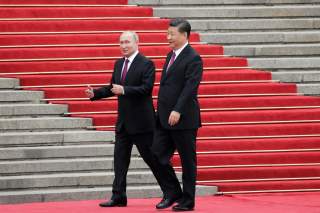China and Russia: A Strategic Alliance in the Making
Defying the long-held convictions of Western analysts, and against huge structural differences, Beijing and Moscow are drawing closer together to meet what each sees as the “American threat.”
In their diplomacy, Russia and China mirror the relationship between the two leaders. On major international issues, they coordinate their positions. For example, when voting in the United Nations Security Council, they agree 98 percent of the time. Russia has backed every Chinese veto since 2007. The two have worked together to create and strengthen new organizations to rival traditional American-led international organizations, including the Shanghai Cooperation Organization and BRICs. For a Russian who wants to visit China, getting a visa takes one day; to visit the United States it takes them three hundred days to obtain a visa application interview.
Economically, Russia is slowly but surely pivoting east. China has displaced the United States and Germany as Moscow’s number one trading partner. Today, China is the top buyer of Russian crude oil. A decade ago, all gas pipelines in Russia flowed west. With the completion of the Power of Siberia pipeline in 2019, China will become the second largest market for Russian gas, just behind Germany.
When U.S.-led Western sanctions excluded Russia from American-dominated dollar-denominated markets, its relationship with China has allowed it to continue to buy and sell. In the current U.S. push to prevent Iran selling oil to the world, Russia is trading goods for Iranian oil and then selling it on to international markets, including China.
Meanwhile, Russian elites continue to look west. They are predominantly European in their culture, history, religion and dreams. Wealthy Russians buy second (and third) homes in London, New York and on the French Riviera. They speak English and travel to Paris, New York or London to shop. Many have children who live in the West.
Cultural change is hard, and slow. But oligarchs who now find themselves the targets of sanctions that prevent them doing business in the United States are exploring alternatives. And some of Russia’s leading thinkers are changing their tune. The Honorary Chairman of Russia’s Council on Foreign and Defense Policy Sergey Karaganov maintains that “the ‘westernizer’ today is a thing of the past. Those looking forward to the future most show interest in the East.” Surveys this year show that 69 percent of Russians hold a negative view of the United States, while the same percentage of Russians hold a positive view of China. When asked “who their enemies are,” two-thirds of Russians point to the United States, ranking it as Russia’s greatest foe. Only two percent of Russians view China as their enemy.
Grievance is a powerful motivator; respect can have a powerful magnetic pull. In Putin’s mind, the greatest geopolitical catastrophe of the twentieth century was the break-up of the Soviet Union. Who was responsible for that break-up? In Xi’s mind, China’s “century of humiliation” only ended once the Communist Party defeated the Nationalist Party in a bloody civil war. Which country supported those nationalists, and continues to arm their island fortress of Taiwan? Against the backdrop of this history, as we reflect on what the United States is now doing, we should ask whether Brzezinski’s warning about the “most dangerous scenario” could soon become a fact.
Graham T. Allison is the Douglas Dillon Professor of Government at the Harvard Kennedy School. He is the former director of Harvard’s Belfer Center and the author of Destined for War: Can America and China Escape Thucydides’s Trap?
Image: Reuters

